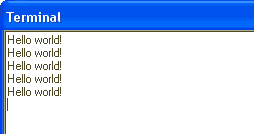

Spoc's "Hello world!"
Spoc is a cpu... guess what? let's use it to display "Hello world!".
For this example, you need an FPGA board with an RS-232 output.1. Software
Compile the following code with spoc_asm// First set the stack pointer (required since we use a subroutine below) do #0x0C00 -> SP BeginString: do #GreetingString -> CS SendChar: sel CS.p do #0x1000 -> WA0 do.byte @ -> @ // transmit one byte out of RS-232 TX // check the RS-232 TX busy bit do #0x1000 -> RA0 LoopTxD_ready: do.bit @ jmp.z=1 #LoopTxD_ready // check the end of string do CS-#GreetingStringEnd jmp.z=1 #SendChar // once the string is completely sent, delay before sending again jsr #Delay jmp #BeginString // delay subroutine Delay: do.dw #200000 -> A DelayLoop: dec.dw A jmp.z=1 #DelayLoop ret GreetingString: data.byte "Hello world!", 13 GreetingStringEnd: // that's all folks
2. Hardware
Let's interface Spoc with an RS-232 TX module.
module spoc_test(clk, TxD);
input clk;
output TxD;
// first instantiate Spoc
wire spoc_WriteData, spoc_WriteEnable, spoc_ReadData;
wire [15:0] spoc_WriteAddress, spoc_ReadAddress;
spoc my_first_spoc
(
.clk(clk), .ExecuteOpcode_Enable(1'b1),
.WriteAddress(spoc_WriteAddress), .WriteData(spoc_WriteData), .WriteEnable(spoc_WriteEnable),
.ReadAddress(spoc_ReadAddress), .ReadData(spoc_ReadData)
);
// second hook it up to an RS-232 TX module
reg TxD_start;
reg [7:0] TxD_data;
wire TxD_busy;
async_transmitter asyncTX(.clk(clk), .TxD_start(TxD_start), .TxD_data(TxD_data), .TxD(TxD), .TxD_busy(TxD_busy));
always @(posedge clk) if(spoc_WriteEnable) TxD_data[spoc_WriteAddress[2:0]] <= spoc_WriteData;
always @(posedge clk) TxD_start <= spoc_WriteEnable & (spoc_WriteAddress[2:0]==3'h7);
assign spoc_ReadData = TxD_busy;
endmodule
Result

If you own an fpga4fun board, press CTRL-T in FPGAconf after configuring your FPGA to get the terminal window.
Otherwise just use your favorite terminal software!